
RallyUp Survey Reveals Giving Tuesday’s Meteoric Rise
November 22, 2021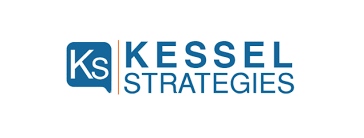
[PODCAST] Gift of Doubt: What if you’re exactly the leader you need to be?
December 3, 2021How Nonprofits Can Use Ecommerce Effectively
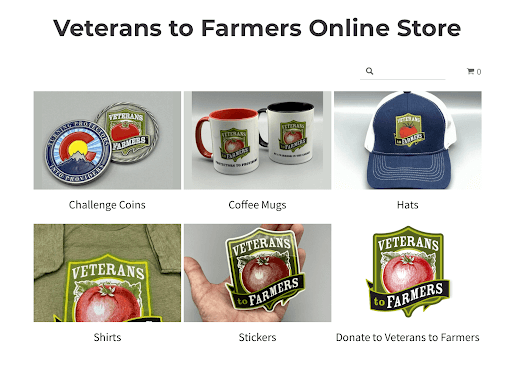
Veterans to Farmers and City Greens Market are two US-based nonprofits that used ecommerce effectively. They successfully used their digital presence to raise funds and awareness for their cause, as well as improve their daily operations. Read on to find out how they did it!
Veterans to Farmers: Fundraising and Awareness with Ecommerce
Veterans to Farmers is a Colorado-based nonprofit that works with US veterans from all over the country. They offer veterans training for sustainable farming. This includes everything from business planning and operation to growing and harvesting to taking that to market or working with restaurants to sell their products.
The tagline of the nonprofit is turning protectors into providers. Veterans are often leaving the service with not a lot of job prospects. Veterans to Farmers is teaching them a way to continue their work, supporting their community by providing for them.
The challenge for the nonprofit was to connect with their community and generate donations and funds for the organization. As there is a broad range of incomes and budgets, a nonprofit needs to make sure that no matter how someone wants to support them, they can do that—be it a monthly $100 donation, a one-time $5 donation, or buying a mug. Here’s how Veterans to Farmers managed to ensure that with their ecommerce platform.
Selling merchandise through an online store
There are many people, especially in the veteran community, who are very proud of the Veterans to Farmers organization. The nonprofit gave them an opportunity to show their appreciation by buying their merchandise and wearing it. Veterans to Farmers set up an online store with Ecwid where their supporters can buy merchandise such as T-shirts, mugs, hats, or stickers. Not only does that provide the organization with some funds, but that also keeps veterans involved and supporting one another.

Collecting donations online
The nonprofit has an incredible mission. But educating and supporting veterans is not inexpensive, and it’s certainly not free. Collecting donations is really important for this organization.
Recurring donations are a life-saver for nonprofits, and Veterans to Farmers understands that. That’s why they made it possible for their supporters to subscribe to regular donations on the nonprofit’s website. This allowed them to streamline the process of donating and encourage site visitors to subscribe to recurring donations.
For example, suppose a person wants to support a veteran through the entire year of training with Veterans to Farmers. In that case, they can sign up and purchase a monthly $100 donation that will cover all the costs for one veteran to be trained and educated for the year.
One-time donations of different amounts are also available on the nonprofit’s website.
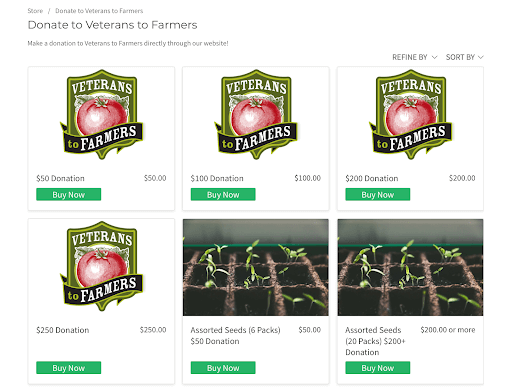
Raising awareness via email
For any nonprofit, connecting with companies, nonprofits, individuals, and institutions surrounding their industry is essential. Raising awareness about the nonprofit is just as important as generating funds. And a great way to raise awareness is through email.
Veterans to Farmers did this by adding a subscribe form to their website so that site visitors can sign up for their newsletter. They also have a monthly marketing email. This helps them keep their community informed about how they can support the nonprofit.
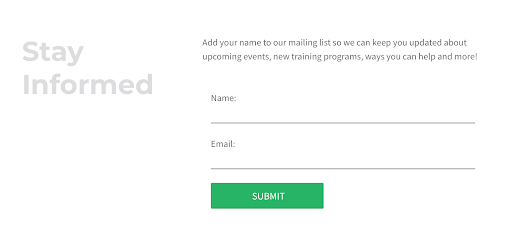
Not only do they send out the emails to their subscribers, but thanks to Ecwid’s integration with Mailchimp, they can directly pull products from their online store and feature them in their emails. They display their products and donation options in their newsletters, providing a seamless one-click purchase process right in the email.
City Greens Market: Moving Operations Online with Ecommerce
City Greens Market is a nonprofit in the Southeast neighborhood of St. Louis, Missouri. That area has historically been a food desert, which is an area that has very limited access to affordable and nutritious food like fresh vegetables, fresh fruits, grains, etc. Historically in the United States, food deserts appear in lower-income neighborhoods. Particularly in St. Louis, these are also neighborhoods where people of color reside.
For City Greens Market, the issue of attacking food deserts and bringing affordable, delicious foods was not just an issue of socioeconomic status but also an issue of race. And during the COVID-19 pandemic, the nonprofit was really struggling to fulfill its mission of providing healthy, safe, delicious foods to people. Grocery stores are crowded places, and operating offline wasn’t aligning with safety measures.
The nonprofit decided to take its operations online. First, they used Google Forms to organize hundreds of grocery items alphabetically and take orders. Customers would go in and check off the products they wanted to buy. The nonprofit would total it, and customers would pick up their order.
Obviously, it wasn’t a smooth process. To improve it, City Greens Market decided to build a digital checkup process on Ecwid to use ecommerce effectively. However, they needed to adapt an online store to their specific needs.
Setting up an online store
City Greens Market had hundreds of grocery items to organize. Not only did they have to upload all those products to an online store, but they also needed to make navigating such a vast assortment convenient for customers. To accomplish their goal, City Greens Market built a simple website with an online store.
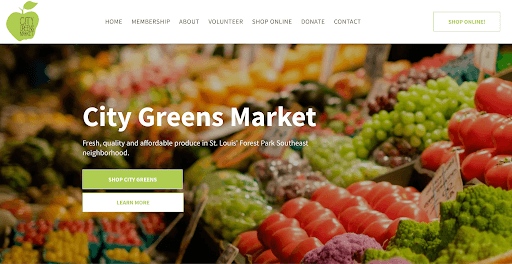
First, they exported all products they had in their Google spreadsheets, turned them into a CSV file, and imported it into their online store. The prices and product names were already there; all they had to do was organize them into categories. When assigning categories to products, City Greens Market was able to add specific products to multiple categories. For example, ice cream could be put in “Dairy” and “Frozen foods,” making it easier for customers to find it.
Setting up member discounts
When it came to setting up the checkout process, it took the nonprofit a little bit of figuring out. There are different prices for City Greens Market members and non-members, so the member status has to be considered at checkout. The nonprofit wanted to allow non-members to check out and pay what they normally would and allow members to get their unique discount associated with their member ID.
City Greens Market used Ecwid to set up unique coupon codes associated with each member’s user ID. This way, customers get the appropriate discount based on their income level. This allowed the nonprofit to have particular people getting their exact rates without calling in the store. The discounts are applied automatically at checkout.
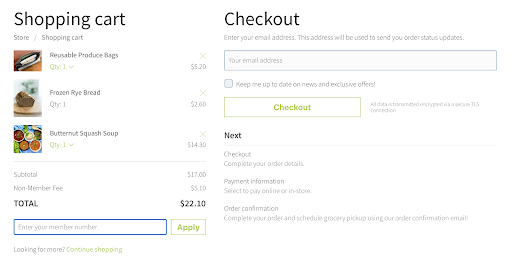
Organizing in-store pickup safely
The pickup process also had to be organized as having large groups of people in a small building wasn’t allowed. The nonprofit had to figure out a way to get food to the at-risk population without having customers come all at once.
Ecwid already has a built-in pickup scheduler. It allows customers to make their orders and then select the time and day of pickup for their products. However, City Greens Market wanted to take it a step further and limit time slots. They customized the pickup tool so that each 15-minute segment could be selected by two customers only. That means only eight customers an hour could pick up their orders.
This way, City Greens Market managed to buffer visitors to prevent lots of customers from coming in and potentially spreading a deadly virus during the pandemic.
***
Nonprofits are constantly looking for new ways to raise funds, improve operations and grow awareness. Many nonprofits have found success by leveraging ecommerce platforms to sell their merchandise or collect donations. They’ve also used it to reach out to their community via email or make their daily operations more efficient for their staff and supporters.
If you want to use ecommerce for your nonprofit, you can start with a free online store built with Ecwid. You’ll be able to sell up to ten products (for example, your merchandise) or collect one-time donations.
*This spotlighted blog post is courtesy of Ecwid
The post How Nonprofits Can Use Ecommerce Effectively appeared first on Nonprofit Hub.
